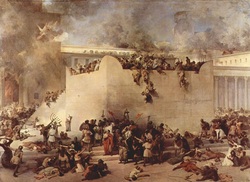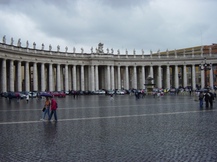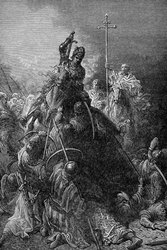|
Overview:
An analysis of Christ's Mission in Matthew 16:13-28 will help Christians to examine what influences their theology. There is too much in this passage to cover in 20 minutes, so a narrow focus is drawn from the parallel situation in Christ's day about maintaining a proper perspective and putting priorities straight in light of the Mission of God and the politics of the day. Christians need to ensure that political stances and agendas are the direct result of biblical principles in light of Christ's Mission and not culturally conditioned preconceptions supported with a smattering of proof-texts lifted from random parts of the bible. Preached on election day, 11-06-12.
0 Comments
The Reforms of Kings Asa, Jehoshaphat, Hezekiah, and Josiah  Francesco Hayez, Destruction of the Temple Entropy was one consequence of the fall, dooming all creation to a slow decay into chaos. Even the loyalty and gratitude of the people the Lord called out of the fray and into his kingdom are not exempt from the effects of entropy. This decay is seen as their faith drifts from God's core tenants through worldly desires of control, convenience, and compromise. To reverse the drift, The Lord periodically raises up radicals who call for reform, to end unorthodox practices and return to a pure relationship of faith. This inevitable cycle is a consistent theme within the history of the church, with clear biblical foundations as seen throughout the Kings of Judah. During the divided monarchy of Israel, the drift that began gradually during the golden age of King Solomon jumped drastically with the northern kingdom of Israel's political split sanctioning blatant compromise in the name of convenience to retain control of the people. While the southern kingdom of Judah retained the core faith, it suffered severe entropy during the reigns of twelve apostate kings influenced by surrounding nations. Of all twenty kings of Judah, eight are remembered for their obedience to God, and of these only four enacted reforms. Through the four reigns of kings Asa, Jehoshaphat, Hezekiah, and Josiah, we can learn what influenced their actions, how they initiated reforms, and what foolish errors they made to interpret the effectiveness of their efforts. By studying their lives we can avoid repeating their mistakes in the cyclical battle against entropy while we fulfill the great commission today.  During the Great Century of missions, how did the colonial and imperial mindset of the west influence the practices of missionaries? What were some positive and negative outcomes of this mission mentality? Is this still a factor for today? Making the distinction between Our Culture, Their Culture, and God's Culture wasn't easy for protestant missionaries for who took advantage of the nations' zeal to colonize distant lands in the 19th Century (the Great Century of missions). As a result, The Great Commission came back into focus and Christ was preached around the globe, but in a mixed message that challenged natives to extract the Truth of the gospel from the cultural baggage of Europe.  What place does our faith have in the “public square” today? When Jesus began his ministry Jews expected that the Kingdom of God He announced would reinstate King David's political state. They missed the all encompassing and timeless plan revealed in the spiritual aspect of Christ's teachings. Yet, today many are in danger of repeating the Jew's misunderstanding by mistaking the Kingdom of God for the Kingdom of America.  How could the Crusades have actually taken place? How could all the violence, pillaging, rape, oppression, & conquest have been committed over hundreds of years, including Christians killing Christians (4th Crusade), all in the name of Christ? What relevance or lessons can we learn for today? Other wars have been a series of unfortunate events led by one warmongering fool after another, but the crusades are especially renowned as one of the darkest moments in Christian history due to the abuse of and particularly by the Church. Overt plundering, sexual violence, and genocidal bloodbaths against the innocent was the rotten fruit from the cross-pollination of Church and State centuries earlier. |
AuthorBrett Yardley: Categories
All
Archives
January 2019
|

